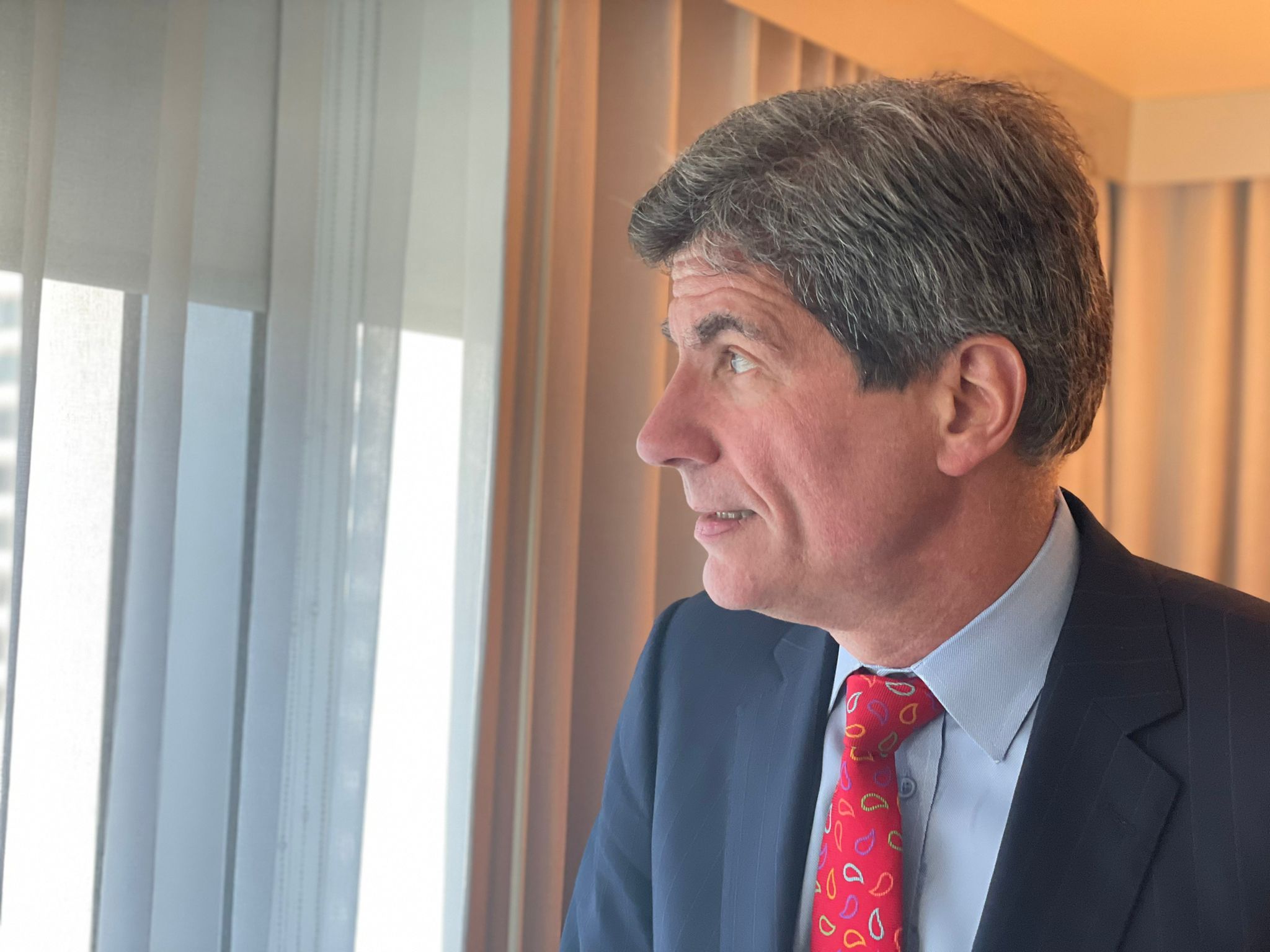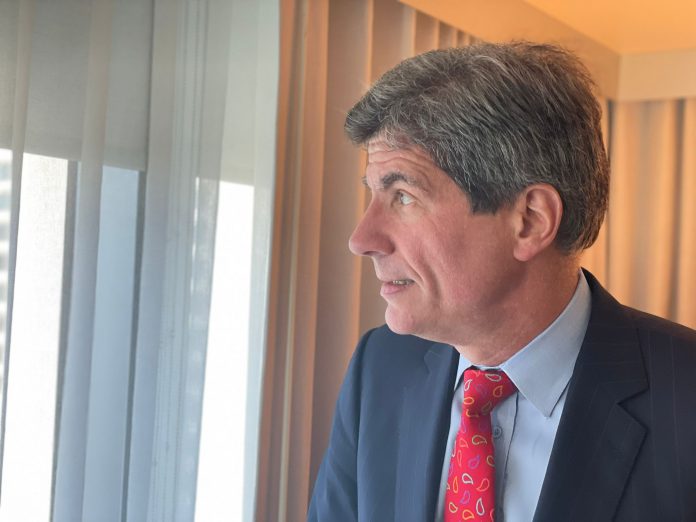José W. Fernández describes the relationship between the United States and Latin America as a marriage. Not everything is perfect, he admits, it’s difficult, but they live in the same house, share interests, problems, and have a unique dialogue that they don’t have with anyone else in the world. “We are realizing that life is much better if we can live together than apart,” he maintains.
Born in Cienfuegos, Cuba, in the midst of the Castro revolution, Fernández is Undersecretary of the Department of State for Economic Growth, Energy and the Environment, areas that the Joe Biden government has placed at the center of its agenda for Latin America. Fernández traveled to the IX Summit of the Americas with the delegation of the Secretary of State, Antony Blinken, and spoke at exclusive for Grupo de Diarios América (GDA)of which La Nación is a founding member.
Faced with criticism for the lack of a United States policy for Latin America, Fernández says that they have to better communicate what Washington does, and that they want to be “a neighbor that helps, and at the same time criticizes.” And in the face of China’s advance, he says that we must work to attract more US investment, but countries must improve the business climate, and they cannot force companies to invest.
– What objectives does the United States have for this Summit?
-There are several objectives. The first is to create a cooperative bilateral relationship with the region, and remind the region that we are neighbors, and we share the problems and we will also share the success. A lot of what we’re trying to do is listen, and also bring to the table some ideas that we want to talk about. The idea is to find a way to work with countries on things that they tell us they want to do, and that requires a dialogue. They come, and they ask us for cooperation and help.
-There is a criticism that there is a lack of a policy for Latin America, what do you respond to that?
-There is a desire in the region to have a neighbor who understands them, and who wants to help them do what any government wants to do, which is to improve the lives of their people in terms of economy, health, security. And there we are. I have heard the same thing, and we tell them that trade with the hemisphere is four times that of China, that they always compare us. We are still the main investor, we have invested 50% more than the second, China. We have donated 70 million doses of vaccines, and for free, we do not sell them, and without conditions. Perhaps we have to communicate to the people of Latin America what we do. But I think we have a lot to be proud of. Latin America has changed. It is no longer a region with the hand asking you for alms. He wants cooperation, he wants more investment. Many seek to be part of the supply chain approach.
Do you think the criticism is exaggerated?
-Not at all. We like. On several occasions, the United States has been accused of imposing its programs on the region. It’s not about that. We are trying, and I think we are succeeding, to show that we want to be a neighbor, a neighbor who helps, and who at the same time criticizes, because it is part of the dialogue that takes place. But he does it with respect and affection.
-Biden will announce an economic agenda, what will the United States offer?
–There is much that can be done in supply chains. What the pandemic and the crisis have shown us is that we depend a lot on Asia, not just on China. It costs us much more to bring some products from Asia than to manufacture them in Honduras or Brazil. It will also include digital commerce, which has many branches, data privacy, security, the expansion of 5G. Let’s talk about transparency issues. If we are successful, we will be able to create growth in Latin America and much closer ties, and we will do so by always insisting on the highest standards. We’ve gotten to a point in America where our companies know we can’t have corruption.
– Why does the United States not compete with China in infrastructure, such as 5G?
Well, let’s go to the data. We have 50% more investment…
-But I’m talking about infrastructure…
-First, it’s not about competing. We put ourselves in the shoes of our neighbors and if it is an investment that creates jobs, that does not harm the environment, that respects human rights, we do not want to compete with China. Upside down. It’s not about us opposing anything, but what we have to do is create reasons for them to want more US investment. 5G… is indisputable, and the countries know it, there are Chinese companies that are part of the government. The cybersecurity of a company that by law has to obey the orders of the Chinese government creates a security problem for you. When there are tenders for telecommunications networks we tell them “be careful”, and we try to explain them. And on many occasions we have supported the investment of other companies, such as Nokia or Ericsson, that are not North American. But it is not about competing, we have to give him another offer, and it is an offer that has better standards and is a better investment.
– Why do you think this can happen?
We have to find ways. In Mexico there is a lot of North American investment, in Argentina we have several mining companies that are doing very well. I think it will happen. But I also think it is important, and we have talked about this many times with the countries of the region, that they improve their investment climate. Clear rules, that do not vary, that are more transparent. What we are trying to do is talk to host countries about what they can do to attract investment. But in part we depend on these axes that we do not control. Our companies are private, they are not state-owned. I can’t force an AT&T to go somewhere.
–But they can give you financing.
–We can give you financing if you want to go. But many times they don’t want to go. In part it has nothing to do with Latin America, but because they are doing well in the United States. Part of it is their fault that they don’t have the horizons to go out. That’s one. We cannot force them. And second, countries have to attract. And there are countries that are successful and attract a lot of foreign investment, and others that are not.
-Which?
-We have seen for many years that Mexico received a lot of investment, Argentina received a lot of investment, then it stopped. Brazil for being Brazil always generated a lot of interest. We cannot force a company to go. That has an advantage and a disadvantage. The advantage is that you have an independent company. The disadvantage is that if you receive investment from a state company, that company will obey the orders of its State.
–What opportunities do you see in energy and the environment?
–Very many. Let’s start with what Latin America has done well. There are many countries that receive 80% of their energy from renewable sources, several countries in Central America, Colombia, Brazil, including hydroelectric power. Renewable energy industries create good jobs. We have reached a time when renewable energy can be cheaper than dirty energy. There are many opportunities for companies from North America, Europe and from many countries. If there is something that the war in Ukraine has shown us, it is that no one can steal the sun and the wind from you. We are working to create more desire to invest, for companies to invest in renewables in Central America and the Caribbean. The important thing is that the private sector has reached a point where it can compete very well with oil and gas.
– How does the war in Ukraine change the opportunities in the region?
I don’t have the full answer. The Russian invasion is unleashing a very strong problem of food insecurity in the region that is going to benefit agriculture, and at the same time it is going to make fertilizers more expensive. We see opportunities in the misfortune that Ukrainians are experiencing. But I can’t answer it clearly because it’s not clear. Commodities are going to increase, but you are going to have inflation. You add that to the supply chains that were destroyed by Covid. In the short term there are countries that are going to benefit. This happens in all crises. There are opportunities, and that is why we want to work on renewable energy and food issues and find a way to reduce the digital divide.
-There are absences of leaders, how do you define the success of the Summit?
-The first success would be that our peoples recognize the need for cooperation with the United States. The success should be, in part, to set aside the headlines of those who do not come. Who came? We did? Are we looking for a way to strengthen ties? And not everything has to be economic issues. Democracy… are we more willing to unite against the dictators of the day? What are we going to do about the war in Ukraine? The first thing that I hope can come out of here is the recognition that we have a lot of common interests and we are pursuing them. And, hopefully, ways to cooperate even more.
-There is talk about common interests, but also about lost, recurrent opportunities, and a lack of interest from the United States towards Latin America, how do you reconcile that?
I think both are realities. It’s like a marriage. Not everything is perfect. And it is a marriage that we are in the same house. It’s the beautiful. If you look at the relations we have with some countries, everything is criticized many times. This here are two regions that know each other very well. The fact that there are 50 million Hispanics in this country means that we know each other. And that we see that, for example, North American infrastructure companies should go much more to Latin America. It is marriage. You tell me that, and I have my counterattack, my counterattack is “give me the conditions for them to go.” It is a dialogue that the Latin American region does not have with any other country in the world. The dialogue that we have between Latin America and the United States is not between Latin America and Europe, and Latin America is not having with China. That’s why it’s so difficult.
– And how do you see the future of that marriage?
I see it with great hope because we have common interests. We share populations, we share interests. We are realizing that life is much better if we can live together than apart. I have a lot of hope, I tell you because in history we have had ups and downs, and that has shown us that if we do it well, with respect, we can both benefit. That is my hope.
By Rafael Mathus Ruiz, La Nación, Argentina/GDA*
*The Grupo de Diarios América (GDA), to which El Nacional belongs, is a leading media network founded in 1991 that promotes democratic values, an independent press and freedom of expression in Latin America through quality journalism for our audiences.









